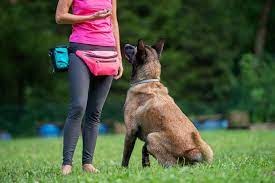January is National Train Your Dog Month: Tips for Successful Dog Training
As dog lovers, we all want well-behaved and obedient companions. National Train Your Dog Month, celebrated each January, serves as a helpful reminder to invest time and effort into training our furry friends. Whether you have a brand new puppy or an older dog in need of some polishing, this is the perfect opportunity to introduce good habits and reinforce desirable behaviors.
Here are some valuable tips to make this training journey a resounding success:
1. Start with Basic Commands: Begin with essential commands like sit, stay, come, and down. These commands create a solid foundation for more advanced training in the future. Keep training sessions short and positive, providing rewards and praise for successful execution.
2. Use Positive Reinforcement: Dogs respond best to positive reinforcement. Reward your dog with treats, praise, or playtime whenever they exhibit correct behavior. This encourages them to repeat the desired actions and strengthens the bond between you and your furry companion. 
3. Consistency is Key: Dogs thrive on routine and consistency. Ensure that all family members are on the same page when it comes to training techniques and commands. Consistency helps prevent confusion and encourages your dog to understand the rules.
4. Patience and Persistence: Dog training is a process that takes time and patience. Some dogs may grasp commands quickly, while others may require more repetition and practice. Remain patient and persistent, celebrating small victories along the way.
5. Socialize, Socialize, Socialize: Expose your dog to various environments, people, and other animals from an early age. Socialization aids in preventing fear, anxiety, and aggression. Enroll in puppy classes or arrange playdates to help your dog become comfortable in different settings.
6. Seek Professional Help when Needed: If you encounter challenges during the training process, don't hesitate to seek guidance from professional dog trainers. They have the expertise to identify and address specific behavior issues, helping you and your dog overcome obstacles.
7. Make Training Fun: Incorporate games and interactive activities into your training sessions to keep your dog engaged and enthusiastic. Training should be a positive and enjoyable experience for both you and your furry friend.
But what if you choose not to train your dog? Here are some potential consequences:
1. Aggression: Without proper training, dogs may display aggressive behaviors towards humans or other animals, posing a risk to their safety and the safety of others.
2. Accidents and Property Damage: Dogs that are not trained may have accidents inside the house, damaging furniture, carpets, or belongings. They may also engage in destructive chewing, causing costly damage.
3. Safety Concerns: Untrained dogs may have a tendency to chase after cars, bicycles, or pedestrians, putting themselves and others at risk of accidents or injury.
4. Vet Visits and Emergency Room Visits: Behavioral issues resulting from lack of training may lead to injuries or illness, requiring emergency veterinary visits and costly medical treatments.
5. Strained Relationships: An untrained dog that continually exhibits unruly behaviors can strain relationships with neighbors, friends, and family members, making it challenging to enjoy social engagements or peaceful living environments.
It is essential to remember that training your dog is not just about obedience, but also about their safety, and the well-being of everyone around them. By investing time and effort into training, you are ensuring a harmonious and fulfilling relationship with your furry friend.
With love, patience, and the right techniques, you can transform your mischievous pup into a well-mannered and delightful companion. Embrace this opportunity to embark on a training adventure with your furry friend, and enjoy the journey together.
Happy National Train Your Dog Month!
